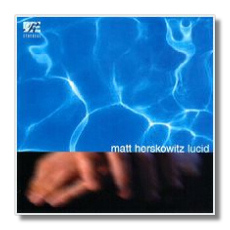
The Internet's Premier Classical Music Source
Related Links
- Latest Reviews
- More Reviews
-
By Composer
-
Collections
DVD & Blu-ray
Books
Concert Reviews
Articles/Interviews
Software
Audio
Search Amazon
Recommended Links
Site News
 CD Review
CD Review
Matt Herskowitz

Lucid
- Bygones
- One Last Time
- Lucid
- Song for Katya
- In Spirit
- Serial Blues
- Burgundy
- Peachfuzz
- A Waltz in Moscow
- Seventh Song
- Tribute To John Coates
Matt Herskowitz Trio
 - Matt Herskowitz, piano
- Matt Herskowitz, piano
 - Rich Syracuse, bass
- Rich Syracuse, bass
 - David Rozenblatt, drums
- David Rozenblatt, drums
Atsundo Aikawa, bass
Grisha Alexiev, drums
Tim Welvaars, harmonica
Tim Ries, soprano saxophone
Ethereal ER-117 DDD
Available from the composer at http://www.mattherskowitz.com/
Matt Herskowitz is a young pianist/composer who performs both jazz and classical music. He entered the 1994 Tchaikovsky International Competition, during which time he wrote A Waltz in Moscow and Song for Katya. In addition to this, his first jazz recording, he has recorded the rarely performed Glazunov Piano Concerto #2 for Chandos Records, which has recently been released.
On the evidence here, I can confidently conclude that he heads a quite talented trio. This group, by the way, performs in the first, second and sixth selections, while in the remaining works, all products of Herskowitz's fertile mind, the pianist is adroitly abetted by an array of musicians, most especially by Tim Welvaars on the harmonica.
Herskowitz's classical background shows through in many of his compositions here. For example, the second piece, One Last Time, is based on a theme in the Moments Musicaux #6 by Schubert, though you won't learn this from the brief but informative album notes. It's not, however, as if Schubert is shanghaied and dragged screaming into a future idiom alien to his chaste classical nature. Rather, Herskowitz merely uses the material as a springboard from which he develops an altogether touching, if light, composition. A Waltz in Moscow begins with dark lilting Ravelian chords, and when Tim Welvaars' harmonica comes in, you suspect for one brief moment that the piece will become a sort of dark jazz counterpart to Satie's Gymnopedie #1. It does have more of the nocturnal Parisian air about it than anything Russian, and some might think the melody too obvious, but it's the disarming thematic simplicity against those quasi-sinister, seductive piano chords that elevates this piece to high art. In fact, this work and Lucid, a thematically attractive piece that deftly exploits instrumental color (try Rich Syracuse's beguiling bass solo starting at 2:33), are the two best offerings here. Not that the others are lesser creations: Song for Katya shares many moods with A Waltz in Moscow and likewise offers much attractive writing for piano and harmonica; Serial Blues is a rambunctious romp that showcases the trio players' virtuosity (hear David Rozenblatt's drum solo beginning at 3:40); and Burgundy is a poignant bluesy utterance, with outpourings of longing, of joy and of disappointment.
Herskowitz's classical background is surely a dominant force in his pianism, as well: his is a much more energetic, driven, and probing style than that of most jazz pianists. He eschews the urge to fashion his virtuosic persona after the iconic Brubeck and Kenton, favoring instead his own grittier and more manic demeanor, one which can still yield sensitively to all the subtleties of nostalgia and blues. This young pianist's technique is fully up to the considerable technical demands here, too. In sum, he is a cultivated talent with an undeniably bright future in both musical worlds. Sound is excellent. Highly recommended.
Copyright © 1998, Robert Cummings












